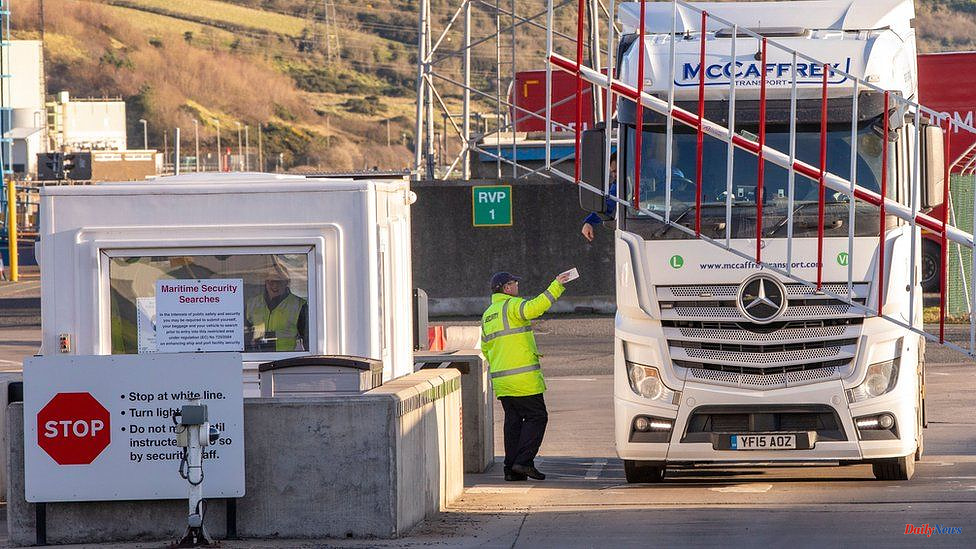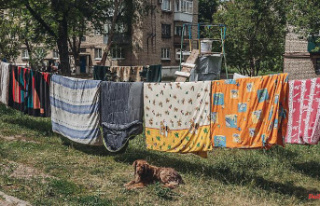A growing dispute over post-Brexit trade arrangements for Northern Ireland could lead to the government scrapping certain parts of the deal. Could this lead to a trade war in which households and businesses could pay a high price?
Officials from the European Union have warned repeatedly of "serious consequences" if the UK overrides a part of the Northern Ireland Protocol.
Simon Coveney (Ireland's foreign minister) warned last November that the whole Trade and Co-operation Agreement, which was created to guarantee free and open trade between the EU and the UK, is dependent on the UK adhering to the Protocol.
However, the conflict in Ukraine has exacerbated both cost-of-living and cooperation between the EU-UK. Mr. Coveney has taken a more conciliatory tone recently, stating that the EU wants to first seek solutions. He warned, however, that any unilateral UK action could lead to "a very difficult Summer".
It also means that the EU could unilaterally scrap part or all of the TCA - although this is unlikely to happen quickly. This would allow the EU tariffs to be imposed on British-made products.
Most cases require a notice period of at least one year and an interfering arbitration process.
There are other levers that the EU can pull in the interim, such as limiting UK fishing vessels from entering EU waters.
After claiming that British actions to delay border formalities in the last year violated the Protocol, Brussels is already investigating interim measures. After agreeing to negotiate, it halted the process. However, it may decide to resume.
The consequences of such actions could be very painful.
Economists warn that the EU could, as has happened in trade disputes with the US, target politically-sensitive products for tariffs to maximise the impact - salmon from Scotland, for example.
Last year, thousands of jobs were supported by the EU's purchase of salmon from Scotland worth PS372m.
Alternativly, the EU could target industries in the so-called Red Wall areas, which are located in north-east England or the Midlands where Labour was defeated by the Conservatives in the last election. These areas are heavily dependent on customs from the bloc.
If all UK-made goods had to be subject to the same tariffs as goods sourced from outside the EU, then agricultural products could face a typical 10% levy with dairy items facing as high as 35% when sold to the bloc.
However, any tariffs placed on British goods will result in higher prices for European customers. This is something that Brussels would not be grateful for.
Most economists believe that such actions would be selective, due to this requirement and others.
The EU could increase red tape in order to make it more difficult for companies to sell into its market. According to a Chamber of Commerce survey of North East exporters, three quarters believe that selling to the EU will be more difficult after Brexit. This is despite export levels falling by more than a tenth of what they were in 2019.
The UK could theoretically respond to any retaliation with its own tariffs. This levy would make it more difficult for European producers to compete with the UK. They've already seen sales drop since Brexit and exports from Germany are already in reverse.
However, this is an option Britain has not yet considered. It could theoretically see additional charges for European-made vehicles and higher staples prices, at a time when UK households already feel the effects of higher bills.
According to economists from London School of Economics, the rise in food imports from the EU during Brexit and after it happened hastily.
A trade war would be a devastating blow to both the UK and EU economies, which are already extremely vulnerable. Jacob Rees Mogg, the Brexit Opportunities Minister, described such an outcome as "acts of self harm", possibly gambling that the EU will not take that risk.
Brussels could also decide to start a process of retaliation to leverage the UK and push it to settle the Northern Ireland dispute.
Nearly five years after the referendum, the debate over Brexit's future direction is still ongoing.












